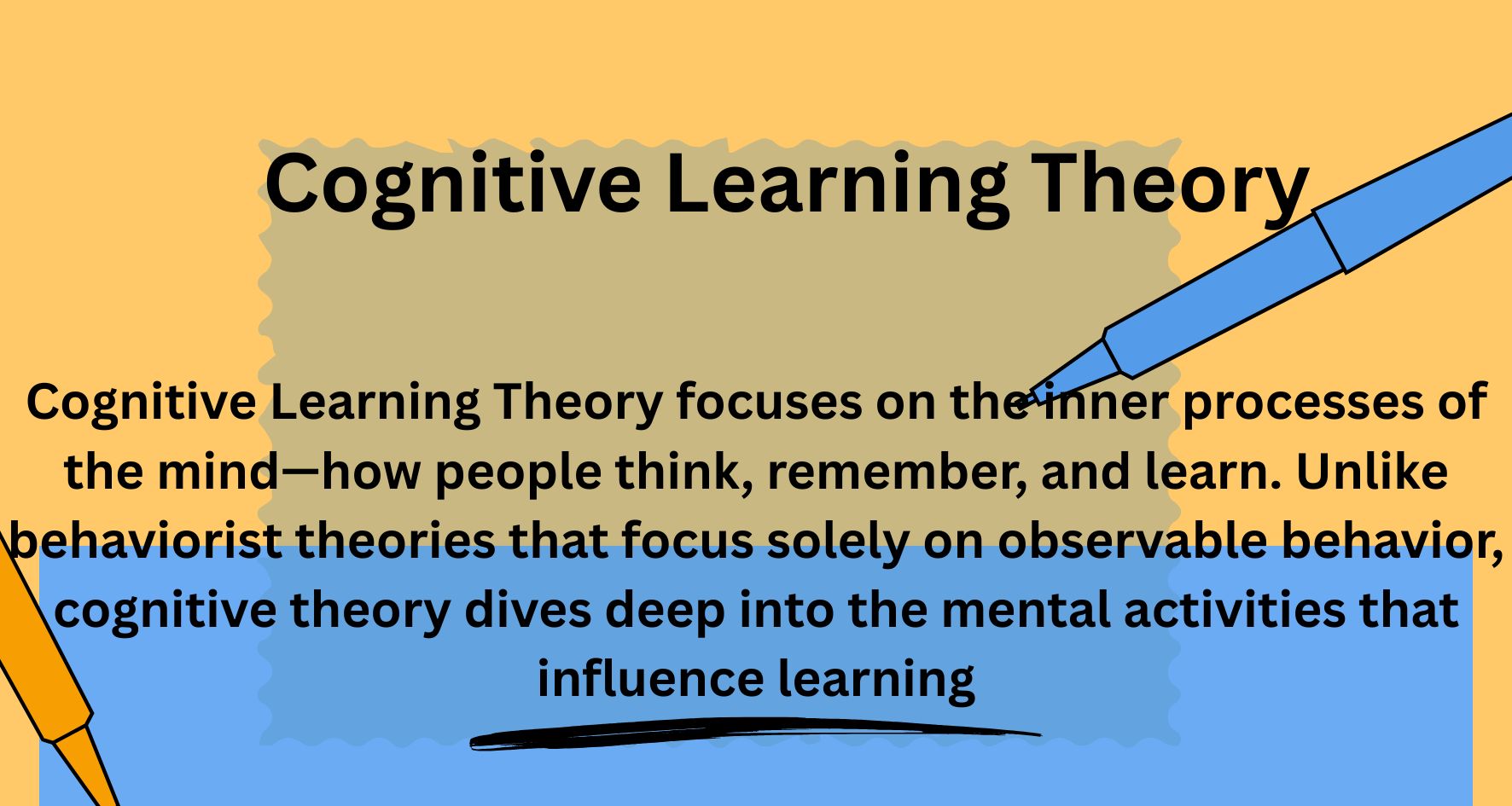
Cognitive Learning Theory: A Modern Approach to Learning and Education
Cognitive Learning Theory focuses on the inner processes of the mind—how people think, remember, and learn. Unlike behaviorist theories that focus solely on observable behavior, cognitive theory dives deep into the mental activities that influence learning.
This theory finds its roots in educational psychology, and was significantly developed by theorists like Jean Piaget, who studied cognitive development in children, and Jerome Bruner, who emphasized discovery learning and constructivism. Cognitive learning suggests that learning is an active process and that learners build new knowledge on the foundation of previous understanding.
Principles of Cognitive Learning
Here are some foundational principles that define cognitive learning:
1. Active Participation
Cognitive learning requires learners to be actively involved in the learning process, not just passive recipients of information. Students are encouraged to ask questions, explore, and reflect.
2. Meaningful Learning Over Memorization
Instead of rote memorization, the focus is on understanding concepts, forming connections, and applying knowledge in real-world scenarios.
3. Building on Prior Knowledge
Learning happens more effectively when it connects to what students already know. Teachers scaffold instruction by introducing new concepts gradually while anchoring them to existing knowledge.
4. Metacognition
Learners are encouraged to think about their own thinking. This helps them plan, monitor, and evaluate their learning strategies.
5. Constructivist Learning
Cognitive learning aligns with constructivism, where students construct their own understanding through experience and reflection rather than being told what to think.
Stages of Cognitive Development (by Jean Piaget)
Jean Piaget proposed four stages of cognitive development, each reflecting a different level of understanding and reasoning:
-
Sensorimotor Stage (Birth–2 years): Learning through sensory experiences and physical interactions.
-
Preoperational Stage (2–7 years): Development of language and imagination, though thinking is still intuitive.
-
Concrete Operational Stage (7–11 years): Logical thinking develops, but it’s still tied to concrete experiences.
-
Formal Operational Stage (12+ years): Ability to think abstractly, reason logically, and plan for the future.
Benefits of Cognitive Learning Theory in Education
Cognitive Learning Theory offers a rich set of benefits that can transform traditional classrooms into dynamic, student-centered environments. By focusing on how the mind processes information, this theory empowers both educators and students to engage in deeper, more effective learning.
1. Improves Critical Thinking and Problem-Solving Skills
Cognitive learning encourages students to go beyond surface-level memorization. By analyzing and synthesizing information, learners develop the ability to think critically and solve complex problems—skills that are essential for success in higher education and future careers.
Example: Instead of simply memorizing historical dates, students might explore the causes and consequences of historical events, which sharpens analytical thinking.
2. Enhances Understanding and Long-Term Retention
Unlike rote learning, cognitive strategies help students build meaningful connections between new information and what they already know. This deep learning approach results in better retention and easier recall of knowledge over time.
Techniques like mind mapping, storytelling, and analogies are frequently used to reinforce understanding.
3. Fosters Independent and Self-Directed Learning
Cognitive learning promotes metacognition—the ability to reflect on one’s own thought process. This enables students to take charge of their learning journey by setting goals, choosing strategies, and evaluating outcomes. Over time, learners become more independent, confident, and self-motivated.
4. Encourages Active Engagement
Rather than passively listening to lectures, students engage in interactive learning methods such as group discussions, problem-solving tasks, simulations, and real-world projects. This active involvement makes learning more enjoyable and impactful.
5. Supports Personalized Learning
Cognitive theory recognizes that every student learns differently. By focusing on mental processes, teachers can differentiate instruction to meet diverse learning needs. Whether a student is a visual, auditory, or kinesthetic learner, cognitive strategies can be adapted to fit individual styles.
6. Improves Academic Performance
When students understand how to learn effectively, their academic outcomes naturally improve. Cognitive learning promotes concept mastery over fact memorization, leading to better performance in tests, assignments, and real-life applications.
7. Promotes Lifelong Learning
Perhaps one of the most valuable benefits is that cognitive learning fosters a mindset geared toward continuous improvement and lifelong learning. Students are trained to ask questions, seek answers, and remain curious—traits that benefit them well beyond formal education.
8. Builds a Foundation for Higher-Order Thinking
Cognitive theory supports the development of higher-order thinking skills such as analysis, synthesis, evaluation, and creativity. These skills are crucial for college readiness and competitive job markets where innovation and critical decision-making are highly valued.
Real-World Applications in Schools and Colleges
Here’s how educators can apply cognitive learning principles in the classroom:
Use of Visual Tools: Concept maps, flowcharts, and graphic organizers help visualize relationships between ideas.
Interactive Learning: Group projects, discussions, and simulations allow students to actively engage with content.
Technology Integration: Smartboards, educational apps, and online learning platforms can make abstract concepts easier to grasp.
Project-Based Learning (PBL): Encourages students to investigate and solve real-world problems collaboratively.
Cognitive Learning vs. Other Learning Theories
Cognitive Learning Theory differs from other major educational theories in its focus and approach. While behaviorism centers on observable behavior and relies heavily on repetition and reinforcement to shape learning, constructivism emphasizes the learner’s personal experiences and encourages self-guided discovery. In contrast, cognitive learning focuses on internal mental processes such as thinking, memory, and problem-solving. It promotes understanding and reflection, helping students actively process and apply knowledge. While behaviorism is well-suited for mastering basic skills and constructivism fosters creativity and exploration, cognitive learning strikes a balance by combining structured knowledge delivery with deep mental engagement, making it especially effective in formal educational settings like schools and colleges.
Tips for Educators and Institutions
Encourage Reflection: Ask students to think about what they’ve learned and how they learned it.
Use Formative Assessments: Quizzes and interactive activities help track cognitive growth.
Promote Inquiry-Based Learning: Let students lead the learning process by asking questions and exploring answers.
Foster a Growth Mindset: Encourage students to see learning as a journey, not a destination.
